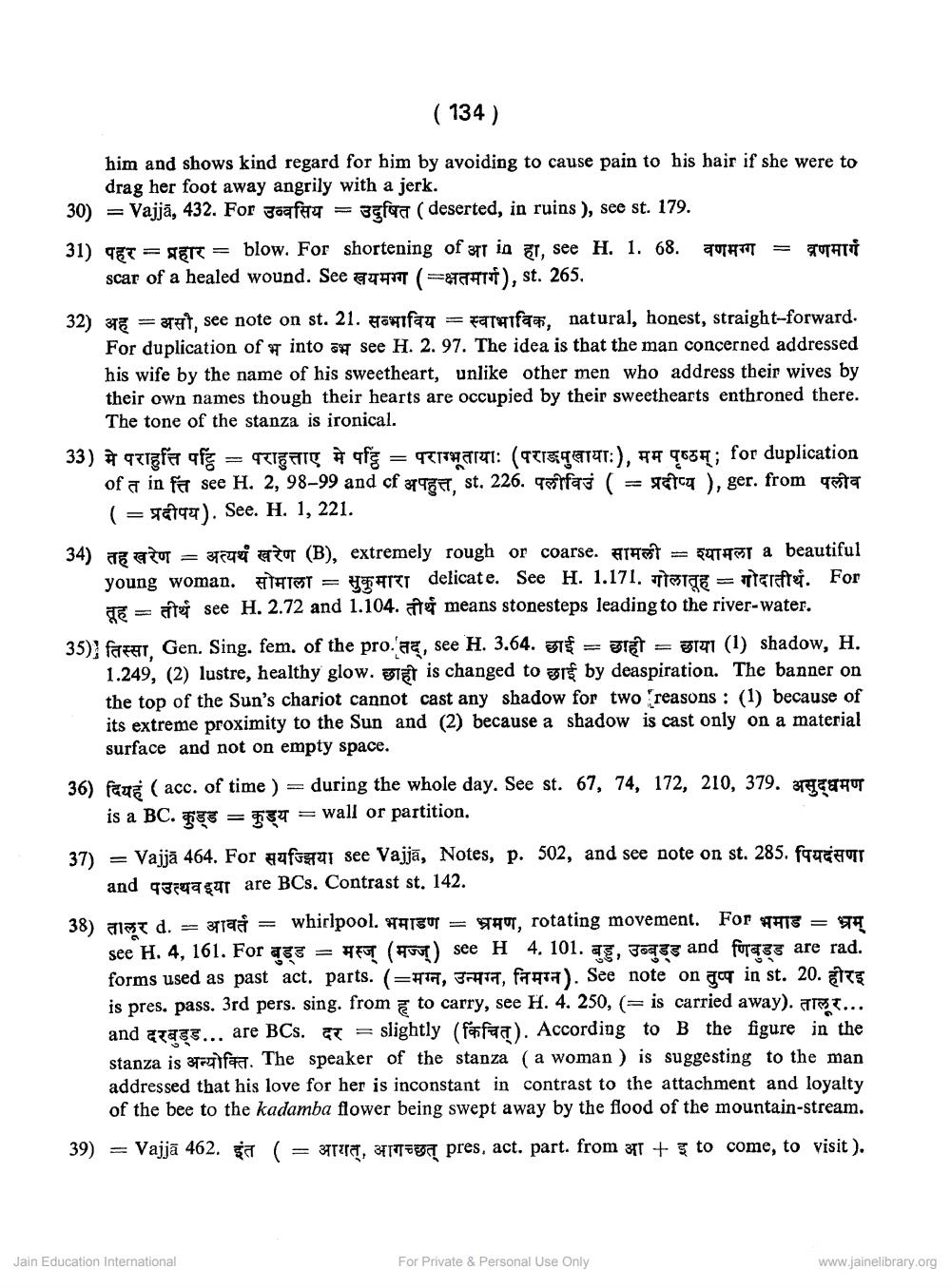________________
30)
31) पहर
=
प्रहार
blow. For shortening of aria gr, see H. 1. 68. वणमग्ग व्रणमार्ग scar of a healed wound. See
(=), st. 265.
(134)
him and shows kind regard for him by avoiding to cause pain to his hair if she were to drag her foot away angrily with a jerk. Vajjā, 432. For f
agfa (deserted, in ruins ), see st. 179.
32 ) अह् = असो, see note on st. 21. सम्भाविय arifa, natural, honest, straight-forward. For duplication of into a see H. 2. 97. The idea is that the man concerned addressed his wife by the name of his sweetheart, unlike other men who address their wives by their own names though their hearts are occupied by their sweethearts enthroned there. The tone of the stanza is ironical.
=
33) zigfa afg rugang à afg पराग्भूतायाः ( परामुखायाः), मम पृष्ठम् for duplication TT:), of a in fer see H. 2, 98-99 and of ager, st. 226. qeffa ( पलीविडं प्रदीप्य), ger from पलीव (प्रदीपप ). See H. 1,221.
=
37)
34) तह खरेण अत्यर्थं खरेण (B), extremely rough or coarse सामली == श्यामला a beautiful young woman. सोमाला सुकुमारा delicate. See H. 1.171. egg- गोदातीर्थ. For तूह see H. 2.72 and 1.104. means stonesteps leading to the river-water. 35)] fereer, Gen. Sing, fem, of the pro.ag, see H. 3.64. BIET = (1) shadow, H. 1.249, (2) lustre, healthy glow. It is changed to or by deaspiration. The banner on the top of the Sun's chariot cannot cast any shadow for two reasons: (1) because of its extreme proximity to the Sun and (2) because a shadow is cast only on a material surface and not on empty space.
36) ft
(acc. of time)
is a BC. कुड्ड = कुड्य
39)
Vajja 464. For and 3
=
Jain Education International
=
=
38) तालूर d. आवर्त
...
whirlpool. भमाडण भ्रमण, rotating movement. For भमाड = भ्रम् see H. 4, 161. For g बुड्ड मस्ज् (मज्ज्) see H 4. 101. बहु, उब्बुद्ध and णिबुद्ध are rad. forms used as past act. parts. (=m, cm, faza). See note on gor in st. 20. is pres. pass. 3rd pers. sing. from to carry, see H. 4. 250, (= is carried away). and दरबुड्ड... are BCs. दर = slightly (f). According to B the figure in the stanza is afr. The speaker of the stanza (a woman) is suggesting to the man. addressed that his love for her is inconstant in contrast to the attachment and loyalty of the bee to the kadamba flower being swept away by the flood of the mountain-stream.
Vajja 462.
pres, act. part. from r+ to come, to visit).
=
ufo see Vajja, Notes, p. 502, and see note on st. 285. fqq are BCs. Contrast st. 142.
(
=
=
during the whole day. See st. 67, 74, 172, 210, 379. KELAT = wall or partition.
=
=
=
For Private & Personal Use Only
www.jainelibrary.org




